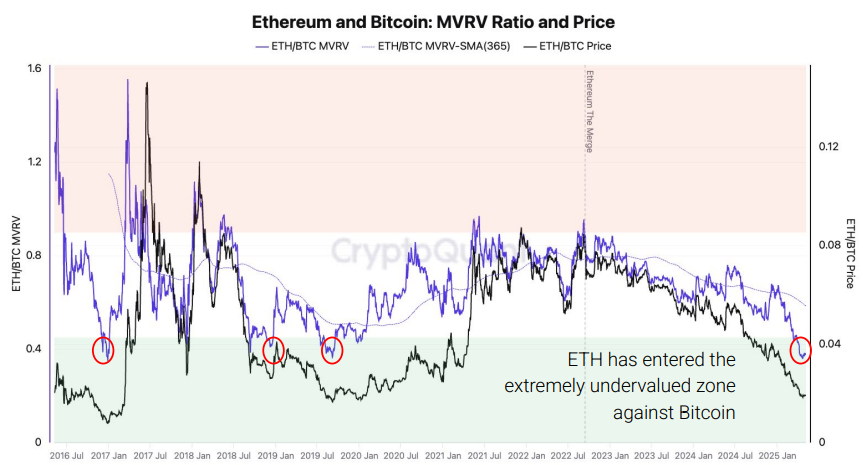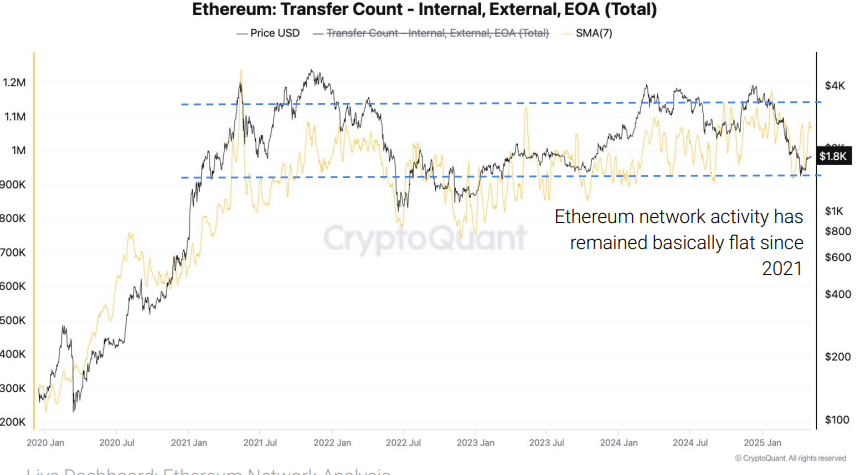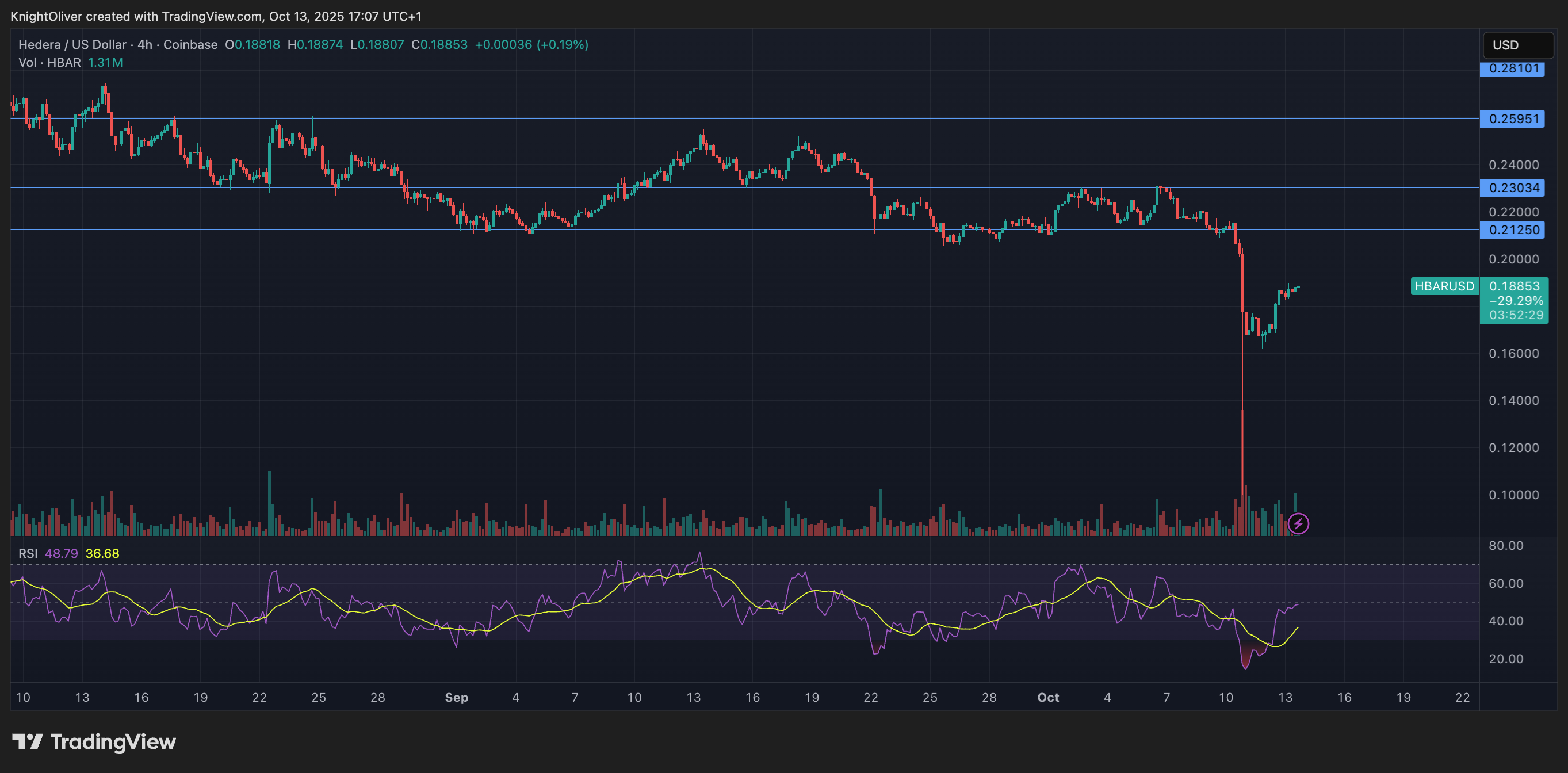Uncategorized
Ether-Bitcoin Ratio Signals ETH is ‘Extremely Undervalued,’ But Headwinds Remain: CryptoQuant

The ether-bitcoin (ETH/BTC) ratio has reached an “extremely undervalued” zone in a move that flashes a historically bullish signal — but traders betting on a sharp ether (ETH) recovery may want to pause.

According to data from on-chain data firm CryptoQuant, the ETH/BTC market value to realized value (MVRV) ratio has dropped to multi-year lows to reach levels that have previously marked periods of ETH outperformance against BTC.
The exchange rate for the two tokens, conventionally called a ratio, peaked above 0.08 in late 2021. The ETH/BTC ratio was 0.019 at press time, down more than 75% from record highs.
MVRV is a metric that compares a token’s current market cap to its realized capitalization, or the value of each coin based on the price it was last moved on the blockchain. This effectively reflects the average cost basis of all coins in circulation.
But the setup may not be as straightforward this time. Network activity remains flat and core usage metrics like transaction count and active addresses have seen little momentum since the last bull run, CryptoQuant said.
The increase in ether total supply is directly tied to the sharp decline in fees burned, as shown in the above chart, showing burn activity falling to near zero. The reason behind this shift is the Dencun upgrade, implemented in March 2024, which significantly reduces transaction fees across the network, the firm said.
Ethereum’s network activity has remained largely flat since 2021, with no sustained growth in usage over the past three years. This stagnation is echoed across key metrics such as transaction volume and active addresses, indicating that Ethereum’s base layer has not experienced meaningful expansion in on-chain activity.

Meanwhile, the growth of Layer 2 solutions such as Arbitrum and Base has come at the cost of mainnet activity. This cannibalization dynamic reduces base layer fees and weakens ETH’s value accrual narrative.
Institutional demand is also cooling: “Investor demand for ETH as a yield and institutional asset is weakening, as evidenced by declining staked ETH and lower balances held by ETFs and other investment vehicles,” CryptoQuant wrote.
“The total value staked has fallen from its all-time high, while fund holdings continue to trend downward, indicating reduced confidence from crypto-native participants and traditional investors,” it added.
The amount of ETH staked has declined notably from it’s all-time high of 35.02 million ETH in November 2024 to around 34.4 million ETH, suggesting that investors may be reallocating capital or seeking more liquid positions amid a less favorable market environment.
Additionally, ETH balances in investment products have fallen by about 400,000 ETH since early February, highlighting a broader decline in institutional demand.
Meanwhile, bitcoin has continued to rise despite a macroeconomic environment, touching nearly $100,000 earlier on Thursday as its appeal as a safe-haven asset grows among investors.
Business
Strategy Bought $27M in Bitcoin at $123K Before Crypto Crash

Strategy (MSTR), the world’s largest corporate owner of bitcoin (BTC), appeared to miss out on capitalizing on last week’s market rout to purchase the dip in prices.
According to Monday’s press release, the firm bought 220 BTC at an average price of $123,561. The company used the proceeds of selling its various preferred stocks (STRF, STRK, STRD), raising $27.3 million.
That purchase price was well above the prices the largest crypto changed hands in the second half of the week. Bitcoin nosedived from above $123,000 on Thursday to as low as $103,000 on late Friday during one, if not the worst crypto flash crash on record, liquidating over $19 billion in leveraged positions.
That move occurred as Trump said to impose a 100% increase in tariffs against Chinese goods as a retaliation for tightening rare earth metal exports, reigniting fears of a trade war between the two world powers.
At its lowest point on Friday, BTC traded nearly 16% lower than the average of Strategy’s recent purchase price. Even during the swift rebound over the weekend, the firm could have bought tokens between $110,000 and $115,000, at a 7%-10% discount compared to what it paid for.
With the latest purchase, the firm brought its total holdings to 640,250 BTC, at an average acquisition price of $73,000 since starting its bitcoin treasury plan in 2020.
MSTR, the firm’s common stock, was up 2.5% on Monday.
Business
HBAR Rises Past Key Resistance After Explosive Decline

HBAR (Hedera Hashgraph) experienced pronounced volatility in the final hour of trading on Oct. 13, soaring from $0.187 to a peak of $0.191—a 2.14% intraday gain—before consolidating around $0.190.
The move was driven by a dramatic surge in trading activity, with a standout 15.65 million tokens exchanged at 13:31, signaling strong institutional participation. This decisive volume breakout propelled the asset beyond its prior resistance range of $0.190–$0.191, establishing a new technical footing amid bullish momentum.
The surge capped a broader 23-hour rally from Oct. 12 to 13, during which HBAR advanced roughly 9% within a $0.17–$0.19 bandwidth. This sustained upward trajectory was characterized by consistent volume inflows and a firm recovery from earlier lows near $0.17, underscoring robust market conviction. The asset’s ability to preserve support above $0.18 throughout the period reinforced confidence among traders eyeing continued bullish action.
Strong institutional engagement was evident as consecutive high-volume intervals extended through the breakout window, suggesting renewed accumulation and positioning for potential continuation. HBAR’s price structure now shows resilient support around $0.189–$0.190, signaling the possibility of further upside if momentum persists and broader market conditions remain favorable.

Technical Indicators Highlight Bullish Sentiment
- HBAR operated within a $0.017 bandwidth (9%) spanning $0.174 and $0.191 throughout the previous 23-hour period from 12 October 15:00 to 13 October 14:00.
- Substantial volume surges reaching 179.54 million and 182.77 million during 11:00 and 13:00 sessions on 13 October validated positive market sentiment.
- Critical resistance materialized at $0.190-$0.191 thresholds where price movements encountered persistent selling activity.
- The $0.183-$0.184 territory established dependable support through volume-supported bounces.
- Extraordinary volume explosion at 13:31 registering 15.65 million units signaled decisive breakout event.
- High-volume intervals surpassing 10 million units through 13:35 substantiated significant institutional engagement.
- Asset preserved support above $0.189 despite moderate profit-taking activity.
Disclaimer: Parts of this article were generated with the assistance from AI tools and reviewed by our editorial team to ensure accuracy and adherence to our standards. For more information, see CoinDesk’s full AI Policy.
Business
Crypto Markets Today: Bitcoin and Altcoins Recover After $500B Crash

The crypto market staged a recovery on Monday following the weekend’s $500 billion bloodbath that resulted in a $10 billion drop in open interest.
Bitcoin (BTC) rose by 1.4% while ether (ETH) outperformed with a 2.5% gain. Synthetix (SNX, meanwhile, stole the show with a 120% rally as traders anticipate «perpetual wars» between the decentralized trading venue and HyperLiquid.
Plasma (XPL) and aster (ASTER) both failed to benefit from Monday’s recovery, losing 4.2% and 2.5% respectively.
Derivatives Positioning
- The BTC futures market has stabilized after a volatile period. Open interest, which had dropped from $33 billion to $23 billion over the weekend, has now settled at around $26 billion. Similarly, the 3-month annualized basis has rebounded to the 6-7% range, after dipping to 4-5% over the weekend, indicating that the bullish sentiment has largely returned. However, funding rates remain a key area of divergence; while Bybit and Hyperliquid have settled around 10%, Binance’s rate is negative.
- The BTC options market is showing a renewed bullish lean. The 24-hour Put/Call Volume has shifted to be more in favor of calls, now at over 56%. Additionally, the 1-week 25 Delta Skew has risen to 2.5% after a period of flatness.
- These metrics indicate a market with increasing demand for bullish exposure and upside protection, reflecting a shift away from the recent «cautious neutrality.»
- Coinglass data shows $620 million in 24 hour liquidations, with a 34-66 split between longs and shorts. ETH ($218 million), BTC ($124 million) and SOL ($43 million) were the leaders in terms of notional liquidations. Binance liquidation heatmap indicates $116,620 as a core liquidation level to monitor, in case of a price rise.
Token Talk
By Oliver Knight
- The crypto market kicked off Monday with a rebound in the wake of a sharp weekend leverage flush. According to data from CoinMarketCap, the total crypto market cap climbed roughly 5.7% in the past 24 hours, with volume jumping about 26.8%, suggesting those liquidated at the weekend are repurchasing their positions.
- A total of $19 billion worth of derivatives positions were wiped out over the weekend with the vast majority being attributed to those holding long positions, in the past 24 hours, however, $626 billion was liquidated with $420 billion of that being on the short side, demonstrating a reversal in sentiment, according to CoinGlass.
- The recovery has been tentative so far; the dominance of Bitcoin remains elevated at about 58.45%, down modestly from recent highs, which implies altcoins may still lag as capital piles back into safer large-cap names.
- The big winner of Monday’s recovery was synthetix (SNX), which rose by more than 120% ahead of a crypto trading competition that will see it potentially start up «perpetual wars» with HyperLiquid.
-

 Business12 месяцев ago
Business12 месяцев ago3 Ways to make your business presentation more relatable
-

 Fashion12 месяцев ago
Fashion12 месяцев agoAccording to Dior Couture, this taboo fashion accessory is back
-

 Entertainment12 месяцев ago
Entertainment12 месяцев ago10 Artists who retired from music and made a comeback
-

 Entertainment12 месяцев ago
Entertainment12 месяцев ago\’Better Call Saul\’ has been renewed for a fourth season
-

 Entertainment12 месяцев ago
Entertainment12 месяцев agoNew Season 8 Walking Dead trailer flashes forward in time
-

 Uncategorized4 месяца ago
Uncategorized4 месяца agoRobinhood Launches Micro Bitcoin, Solana and XRP Futures Contracts
-

 Business12 месяцев ago
Business12 месяцев ago15 Habits that could be hurting your business relationships
-

 Entertainment12 месяцев ago
Entertainment12 месяцев agoMeet Superman\’s grandfather in new trailer for Krypton





